Get started quickly, see results immediately, no code needed.
26 Best Workflow Apps to Supercharge Your Productivity in 2024
When working from the road, it’s nice to know that you can still have access to your organization’s workflow processes. That’s why workflow apps are so useful.
There are tons of workflow management solutions out there, but not all of them have mobile applications. So to help you find the right tool for your team that also comes with an app so they can work from anywhere, we’ve put together a list of the top 26 workflow apps plus some additional information so you can be an educated shopper.
In this article, we’ll cover:
- The top 26 workflow apps
- What are workflow apps?
- Types of workflow apps
- Features to look for in workflow apps
- Download today!
The top 26 workflow apps
Process Street

Process Street is a powerful business process management platform that simplifies workflow automation. It enables organizations to create, track, and optimize recurring processes through intuitive checklists. With features like conditional logic and AI-generated workflows, Process Street enhances efficiency, accountability, and collaboration, making it an invaluable tool for businesses striving for operational excellence.
Key features:
- Checklist automation: Create and automate dynamic checklists for recurring processes.
- Conditional logic: Customize workflows with conditional logic based on responses.
- Custom workflows: Facilitate team collaboration on tasks and processes.
- Integration capabilities: Seamlessly integrate with tons of apps and tools.
- Task assignment: Assign and track responsibilities within processes.
- Data collection: Gather and store data through forms within checklists.
- Reporting and analytics: Generate insights with analytics on process performance.
- Version control: Maintain and track versions of checklists for auditing.
- API access: Connect with other applications through APIs.
- Document storage: Attach and manage documents relevant to processes.
Pros:
- Intuitive interface makes it user-friendly.
- Offers secure data handling and storage.
- It has a mobile application.
- Custom automated workflows can be made with AI.
- It has lots of premade workflow templates to choose from.
- Great for employee onboarding.
- It makes communication between team members super simple.
- It has excellent analytics features.
Cons:
- There is no free plan.
Monday.com

Monday.com is a dynamic work operating system designed to streamline collaboration and project management. It provides a visual and customizable platform for teams to manage tasks, projects, and workflows efficiently. Monday.com helps teams enhance communication and productivity while adapting to diverse work processes.
Key features:
- Workspaces: Create customized workspaces for different projects.
- Boards: Visualize tasks and projects through customizable boards.
- Pulses: Individual task cards with detailed information.
- Timeline view: Display project timelines for better planning.
- Automations: Streamline workflows with automated actions.
Pros:
- Attach and share files directly within the platform.
- Real-time collaboration with team members.
- Create and customize visual dashboards for insights.
- Responsive customer support for assistance.
Cons:
- The free plan has very limited features.
- It doesn’t offer an offline mode.
Trello

Trello is a popular online tool that utilizes boards, lists, and cards to streamline project management. It simplifies tasks, fosters team collaboration, and visualizes workflows in an easy-to-understand format. Trello’s intuitive design empowers teams to organize and prioritize work seamlessly, making it a go-to choice for various projects.
Key features:
- Boards, lists, and cards: Organize tasks hierarchically.
- Drag-and-drop: Intuitive interface for easy task management.
- Labels and tags: Categorize and color-code tasks for clarity.
- Power-ups: Extend functionality with integrations and automations.
- Activity log: Track changes and updates on boards.
Pros:
- Adaptable to various project management styles.
- Boards and cards offer a clear visual representation.
- Users can create boards tailored to their needs.
- Super budget-friendly, which makes it great for small businesses.
Cons:
- It has limited control over data security compared to self-hosted solutions.
- It has very limited automation features compared to other tools.
Wrike

Wrike is a robust project management and collaboration platform designed to streamline workflows and enhance team productivity. Its dynamic interface and flexible structure cater to diverse project needs, fostering efficient communication and project coordination. Wrike empowers teams to manage tasks, projects, and resources seamlessly for successful project outcomes.
Key features:
- Time tracking: Monitor and analyze time spent on tasks and projects.
- Resource management: Allocate and manage team resources effectively.
- Task management: Organize and prioritize tasks efficiently.
- Project planning: Plan and visualize projects with timelines and Gantt charts.
- Collaboration: Facilitate real-time collaboration and communication.
Pros:
- Efficient allocation and management of team resources.
- Convenient file sharing and collaboration within the platform.
- Adaptable to various project management needs.
- Seamless integration with numerous third-party apps.
Cons:
- Basic features in the free plan may be insufficient for larger teams.
- Can be resource-intensive in terms of memory and processing.
Airtable

Airtable combines the flexibility of spreadsheets with the power of databases, making it a versatile tool for tracking tasks, projects, and product development workflows. Airtable offers customization and collaboration, streamlining data management in product management processes.
Key features:
- Spreadsheets: Organized project information in customizable spreadsheets.
- Kanban boards: Assign project tasks with Kanban boards.
- Approval process control: Create approval processes for quality control
- Data storage management: Store and retrieve project data securely.
Pros:
- It has lots of premade templates.
- Very affordable.
- Its spreadsheets have a lot of features and capabilities.
Cons:
- Spreadsheets don’t allow long sentences.
Slack

Slack stands as a versatile collaboration platform, streamlining communication among teams with channels, direct messaging, and file sharing. Known for its user-friendly interface and integrations, Slack fosters efficient teamwork, offering a centralized hub for discussions, project management, and seamless collaboration across diverse work environments.
Key features:
- Channels: Organizes communication into channels based on topics, teams, or projects for focused discussions.
- Direct messaging: Allows one-on-one or group messaging for quick and private conversations.
- File sharing: Facilitates sharing files, documents, images, and more within conversations.
- Integrations: Integrates with various apps and tools for enhanced functionality and workflow.
- Searchable history: Provides a searchable archive of conversations and shared files for easy retrieval.
Pros:
- Supports automation through bots and apps for streamlined workflows.
- Allows customization with themes, emojis, and personalized notifications.
- Provides tools like polls, reminders, and shared to-do lists for efficient teamwork.
- Offers various security measures like data encryption and two-factor authentication.
Cons:
- The free plan only stores messages for 30 days.
- Channels can multiply rapidly, requiring active management to avoid confusion or redundant channels.
Asana

Asana is a versatile project management software designed to streamline team workflows. It enables users to organize tasks, set priorities, and track project progress in real-time. Asana empowers teams to enhance productivity and achieve their goals efficiently.
Key features:
- Task management: Organize tasks and projects efficiently.
- Project timelines: Visualize project timelines and milestones.
- Due dates and priorities: Set deadlines and prioritize tasks.
- Attachments and comments: Share files and communicate within tasks.
- Customizable workspaces: Tailor workspaces to fit team needs.
Pros:
- Enables the establishment of task dependencies for better planning.
- Frequently introduces new features and improvements.
- Provides a functional free plan for smaller teams.
- Users can monitor and manage multiple projects in one view.
Cons:
- More advanced features are available in premium plans, which may be costly.
- Might feel too robust for straightforward task management.
Miro

Miro, a collaborative online whiteboarding platform, is often used for workflow management. It offers visual tools for brainstorming, creating product roadmaps, and organizing user story maps.
Key features:
- Flowchart creation: Create and customize flowcharts.
- Innovation management: Keep track of ideas and documents.
- Product roadmap tools: Design project roadmaps with whiteboards.
- Project management: Use flow charts to design project management processes.
Pros:
- It has a robust set of product features.
- Excellent for idea sharing.
- Supports video conferencing.
Cons:
- It has occasional performance issues.
Lucidchart
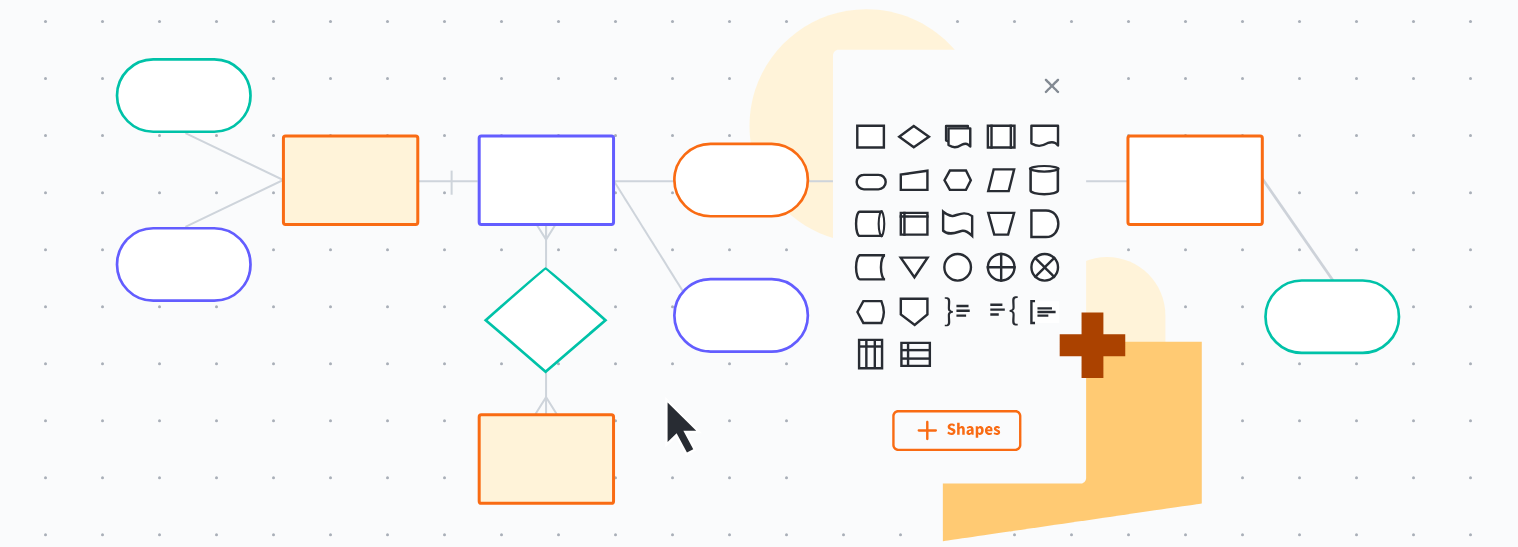
Lucidchart is a versatile cloud-based platform known for its intuitive interface, enabling seamless creation of diagrams and visual representations. Renowned for collaborative capabilities, it facilitates team brainstorming and process mapping. Its adaptability across industries makes it a go-to choice for illustrating complex concepts and workflows.
Key features:
- Shape libraries: Extensive libraries for symbols and shapes.
- Diagram creation: Tools for creating flowcharts, mind maps, org charts, etc.
- Presentation mode: Ability to present diagrams.
- Collaborative editing: Simultaneous editing by multiple users.
- Revision history: Track changes made to diagrams.
Pros:
- Ability to link shapes and objects.
- Embed diagrams in websites or documents.
- Capability to work on diagrams offline.
- Ability to customize colors, fonts, and styles.
Cons:
- There is an object limit in the free version.
Basecamp
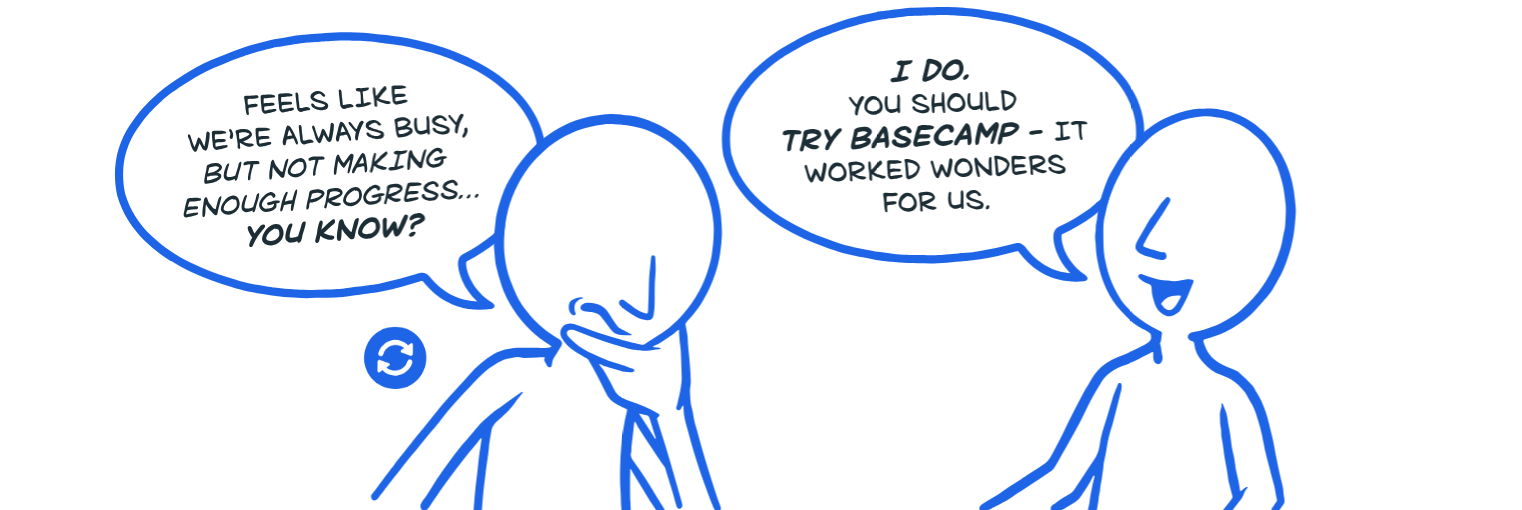
Basecamp is a workflow management tool that simplifies collaboration with to-do lists, schedules, and file sharing. It fosters teamwork through discussions and centralized information. Known for its intuitive interface and flexibility, Basecamp streamlines communication and task organization for teams, offering a cohesive platform for efficient project handling.
Key features:
- To-do lists: Assign tasks, set deadlines, and track progress.
- File sharing: Share documents, images, and files within projects.
- Discussions: Centralized communication through message boards.
- Campfire chat: Real-time group chat for quick discussions.
- Automatic check-ins: Scheduled updates and progress reports.
Pros:
- Discussions, chats, and document sharing in one place streamline collaboration.
- Efficient task assignments, tracking, and deadlines help in project organization.
- Tailors projects and workflows to suit team preferences.
- Tracks changes and maintains document history for improved collaboration.
Cons:
- Extensive features may overwhelm users looking for a simpler solution.
- Reporting and analytics features might be basic for some users’ needs.
Scoro
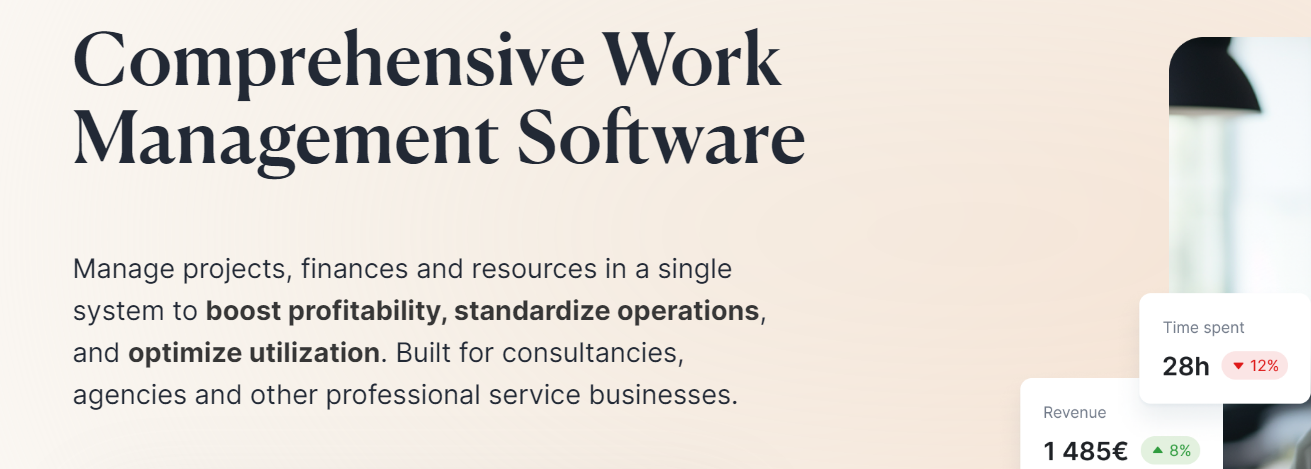
Scoro stands as a comprehensive business management solution, merging project and financial management with CRM and billing. It unifies processes, providing a centralized platform for teams. With its customizable dashboards and automation, Scoro streamlines workflows, empowering businesses to drive productivity and make informed decisions for sustained growth and success.
Key features:
- Financial management: Manages invoices, budgets, and expenses.
- CRM integration: Manages customer relationships and interactions.
- Billing and invoicing: Generates invoices and tracks payments.
- Resource planning: Allocates and manages resources for projects.
Pros:
- Integrates with email for communication and updates.
- Tracks and manages inventory levels.
- Sets and tracks organizational or project goals.
Cons:
- Not suitable for freelancers or large enterprises.
Quickbase

Quickbase is a versatile no-code platform empowering businesses to build custom applications. It streamlines workflows, enhances collaboration, and centralizes data management, fostering agility and efficiency. It enables users to create tailored solutions without coding, catering to diverse organizational needs across industries.
Key features:
- Custom app building: Create tailored applications without coding knowledge.
- Workflow automation: Streamline processes and automate tasks.
- Data integration: Connects with various sources for seamless data exchange.
- Form building: Design and deploy custom data entry forms.
- Task management: Track tasks, deadlines, and progress within apps.
Pros:
- Allows integration and customization with APIs for extended functionality.
- Assign roles and permissions for data access.
- Facilitate teamwork and communication within apps.
- It is completely customizable to specific energy management needs.
Cons:
- Requires time and expertise to build a functioning app.
Calendly

Calendly simplifies scheduling, streamlining appointment booking and coordination. It offers seamless integration with various calendars. By facilitating effortless meeting setups and personalized availability, Calendly empowers users to manage their schedules and enhance professional engagements efficiently.
Key features:
- Customizable scheduling: Set preferred meeting times, buffers between meetings, and specific availability for different types of appointments.
- Personalized event types: Creates various event types with specific durations, locations, and requirements.
- Team scheduling: Facilitates coordination among team members.
- Embeddable widgets: Integrates Calendly directly into websites or emails.
- Time zone detection: Automatically adjusts meeting times based on participants’ time zones.
Pros:
- Offers the flexibility to set different meeting locations.
- Seamlessly syncs with popular calendars like Google Calendar and Outlook.
- Sends reminders and confirmations to participants.
- Customizes scheduling pages to align with brand aesthetics.
Cons:
- Users have reported frequent problems with the Outlook integration.
- There is no Zoom integration with the free plan.
Creatio

Creatio is a comprehensive low-code platform that empowers businesses to streamline processes and drive productivity. It combines CRM and BPM capabilities to enhance customer engagement and optimize workflows. With a focus on agility, Creatio facilitates rapid application development, enabling organizations to adapt and innovate in today’s dynamic business environment.
Key features:
- Low-code platform: Enables rapid application development with minimal coding.
- Case management: Efficiently manage and resolve customer cases.
- 360-degree customer view: Comprehensive customer information for improved engagement.
- Marketing automation: Streamline marketing processes and campaigns.
- Sales automation: Automate sales processes for increased efficiency.
Pros:
- Integrates customer relationship management with business process management.
- Offers robust tools for data analysis and reporting.
- Automates and optimizes complex business processes.
- Facilitates efficient customer service management.
Cons:
- Setting up complex customizations may require technical expertise.
- Some advanced features are available only in higher pricing tiers.
PandaDoc

PandaDoc redefines document automation, revolutionizing the way businesses handle contracts and proposals. Its platform offers seamless creation, distribution, and e-signature capabilities, streamlining workflows. Empowering collaboration and efficiency, PandaDoc simplifies document management, fostering growth and agility in today’s dynamic business landscape.
Key features:
- Workflow automation: Automated document workflows and approvals.
- Payment processing: Capability to collect payments within documents.
- Content library: Storage and reuse of frequently used content in documents.
- Document creation: Easy creation of professional and customizable documents.
- Document analytics: Insights into document engagement and recipient actions.
Pros:
- Offers pre-designed templates for proposals, contracts, and other documents.
- Provides real-time collaboration and commenting on documents.
- Legally binding electronic signatures for document approvals.
- Has a great content library that offers the storage and reuse of frequently used content in documents.
Cons:
- It doesn’t offer a free plan.
- Relies on third-party integrations for some functionalities.
Kintone

Kintone is a versatile cloud-based collaboration platform fostering agile teamwork and efficient workflow management. Its emphasis on customization and user-friendly app creation empowers businesses to tailor solutions without extensive coding.
Key features:
- Customizable workspaces: Tailors workspaces to suit specific needs.
- App builder: No-code app creation for diverse business functions.
- Workflow management: Streamlines and automates workflows.
- Database management: Stores and organizes data efficiently.
- Permission controls: Manages access and permissions for users.
Pros:
- Generates insights for informed decisions.
- Organizes and manages documents efficiently.
- Easily creates and deploys custom forms.
- Manages schedules and events.
Cons:
- Some users have difficulty setting up access permissions.
Bitrix24

Bitrix24 is an all-in-one business suite fostering collaboration and productivity. It integrates tools for communication, project management, and CRM, empowering seamless workflows. With emphasis on scalability and customization, it serves as a comprehensive platform, catering to diverse organizational needs while promoting efficient team collaboration and task management.
Key features:
- Workflow automation: Create automated processes to streamline repetitive tasks.
- Email marketing: Design and launch email marketing campaigns within the platform.
- Sales automation: Automate sales processes, from lead generation to closing deals.
- Telephony: Make calls directly from Bitrix24 and manage call logs efficiently.
- HR management: Manage employee profiles, leave requests, and HR documents.
Pros:
- Conducts video meetings and webinars for remote collaboration.
- Sets task dependencies for better project planning and execution.
- Creates websites or landing pages using built-in tools.
- Visualizes and manages the sales pipeline and stages.
Cons:
- Reporting capabilities are limited.
- It doesn’t handle large files as well as similar products.
ProcessMaker
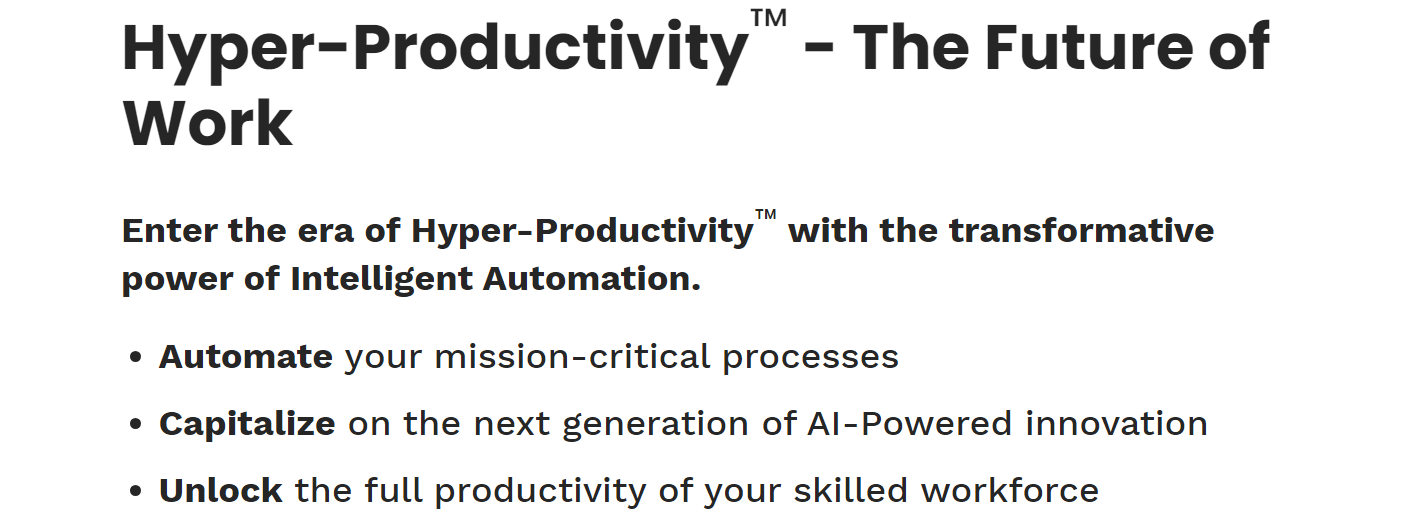
ProcessMaker is a leading workflow automation platform, known for its user-friendly interface and adaptability. It emphasizes streamlining processes, optimizing productivity, and facilitating collaboration. Its focus on intuitive design and flexibility empowers organizations to orchestrate complex workflows seamlessly, fostering innovation and operational efficiency.
Key features:
- Workflow automation: Automate and streamline complex business processes without manual intervention.
- Drag-and-drop interface: Intuitive interface for building workflows and forms visually.
- Form builder: Easily create custom forms tailored to specific business needs.
- Integration capabilities: Integrate with various third-party applications and systems.
- Task management: Assign, monitor, and manage tasks within workflows efficiently.
Pros:
- Centralizes storage and management of documents within processes.
- Details logs tracking all activities within workflows for compliance and analysis.
- Routes tasks based on predefined criteria or decisions.
Cons:
- It has somewhat frequent bugs that can be disruptive.
Qntrl

Qntrl is a dynamic platform empowering businesses with comprehensive control and visibility over complex processes. It focuses on orchestrating workflows seamlessly, fostering collaboration, and delivering actionable insights. It enables users to optimize operations and drive efficiency through tailored process management solutions.
Key features:
- Business rule implementation: Apply logic-based rules to guide process flow.
- Customization via API: APIs for customization and integration with other systems.
- Compliance management: Ensure adherence to industry regulations and standards.
- Time tracking: Monitor and manage time spent on tasks within workflows.
Pros:
- Manages different versions of processes or workflows.
- Offers robust measures to secure sensitive information.
- Supports various languages for global accessibility.
Cons:
- Its integration capabilities are lacking compared to other similar apps.
airSlate

airSlate revolutionizes workflow automation with its comprehensive platform, empowering businesses to streamline operations seamlessly. It prioritizes efficiency and collaboration and offers dynamic solutions for process management, transforming complex tasks into automated, user-friendly experiences tailored to diverse organizational needs.
Key features:
- Document generation: Create and manage documents efficiently.
- E-signature: Securely sign documents online.
- Form building: Easily create custom forms.
- Document storage: Securely store and organize documents.
- Audit trails: Track activity logs for compliance and analysis.
Pros:
- Monitors time spent on tasks.
- Secures sensitive data with encryption.
- Assigns and monitors tasks within workflows.
Cons:
- It has a big learning curve for some users.
TrackVia
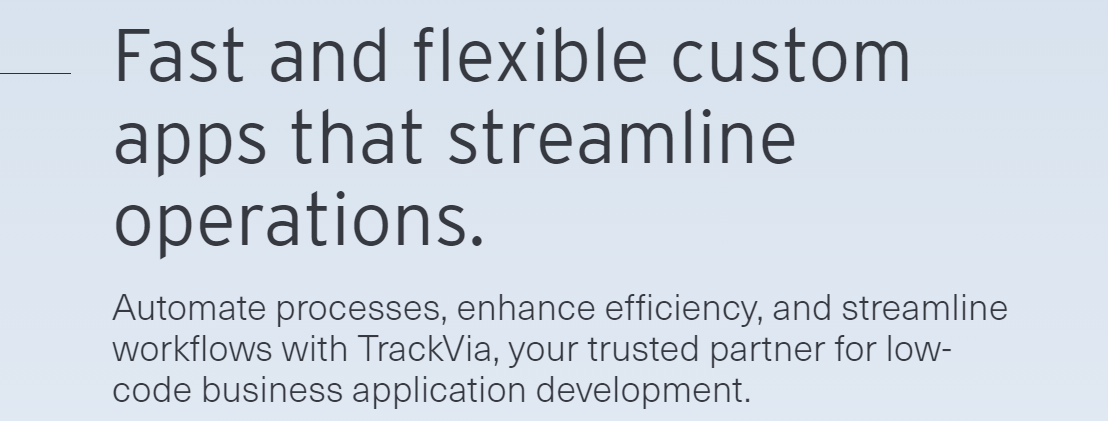
TrackVia is a no-code platform that gives businesses the ability to build and manage custom applications tailored to their unique processes. Renowned for its user-friendly interface, it facilitates streamlined workflow automation and centralized data management, driving efficiency and fostering collaboration across diverse industries and operational complexities.
Key features:
- Custom app building: Create tailored applications without coding.
- Data centralization: Centralize and manage data efficiently.
- Dashboards: Create personalized views for key metrics.
- Role-based access control: Administer user permissions based on roles.
Pros:
- Routes tasks based on predefined criteria.
- Scales the application to suit growing needs.
- Facilitates teamwork and communication.
Cons:
- The reporting capabilities are limited.
Zoho Creator
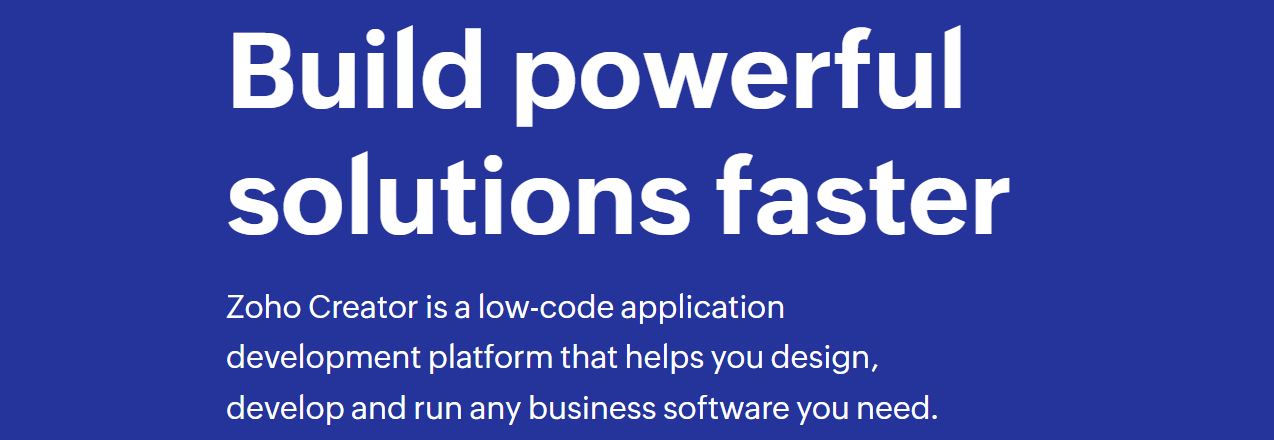
Zoho Creator is a robust no-code platform allowing users to build tailored applications to streamline business processes. It fosters seamless automation and data management. This versatile tool caters to diverse needs, offering dynamic solutions for efficient workflow orchestration across industries.
Key features:
- Calendar and scheduler: Plan and organize tasks and events.
- Custom reports: Generate tailored reports as needed.
- Geolocation and maps: Integrate maps and location-based features.
- App building: No-code platform to create custom applications.
Pros:
- Automates and streamlines business processes.
- Centralizes and manages data efficiently.
- Tracks activities for compliance and analysis.
Cons:
- The features when working offline are very limited.
Mattermost

Mattermost is a powerful open-source platform prioritizing secure, self-hosted messaging for teams. Renowned for its focus on privacy and control, it fosters seamless communication and collaboration across organizations. With robust customization and integrations, it empowers teams to tailor their communication experience to their unique needs.
Key features:
- Messaging channels: Create public or private channels for team discussions.
- Threaded messaging: Organize discussions within threads for clarity.
- File sharing: Share documents, images, and files within chats.
- Voice and video calls: Conduct audio and video calls within the platform.
- Search functionality: Find messages, files, and information quickly.
Pros:
- Controls access and content within channels.
- Defines and manages different user roles and permissions.
- Builds and integrates custom bots for automation.
- Backups and restores data as needed.
Cons:
- It sometimes requires a restart in order to work properly.
- Screen sharing doesn’t always work.
Fluix

Fluix stands as a versatile platform facilitating seamless document management and workflow automation. It gives businesses the ability to streamline processes, collect data, and collaborate effortlessly. Fluix prioritizes mobility, enabling efficient document handling and task management across various industries and operational landscapes.
Key features:
- Document management: Store, organize, and access documents securely.
- Workflow automation: Automate and streamline business processes.
- Electronic signatures: Securely sign documents electronically.
- Annotations and markups: Add comments and annotations to documents.
- Task management: Assign, track, and manage tasks within workflows.
Pros:
- Users can work on documents without internet connectivity.
- Offers users the ability to create standardized templates for documents.
- Shares documents and files securely.
- Sets schedules and deadlines for tasks.
Cons:
- Adding and opening hyperlinks in documents can be difficult at times.
- It doesn’t always slow the number of selected files.
Ryver

Ryver is a unified communication platform combining team messaging, task management, and workflow automation. Renowned for its simplicity and versatility, Ryver fosters seamless collaboration, streamlining discussions and task tracking. It emphasizes efficiency, enabling teams to work cohesively across diverse projects and workflows.
Key features:
- Team messaging: Real-time communication in public or private channels.
- Task management: Create, assign, and track tasks within the platform.
- File sharing: Share documents, images, and files within chats.
- Topic threads: Organize discussions within threads for clarity.
- Voice and video calls: Conduct audio and video calls within the platform.
Pros:
- Visualizes and organizes tasks on boards for easy tracking.
- Connects with email for seamless communication.
- Plans and organizes events and schedules.
- Provides read receipts.
Cons:
- It can be difficult to tell who is speaking in large group calls.
- The app can take a long time to load.
ProofHub

ProofHub serves as an all-in-one project management and collaboration tool, streamlining team communication and task organization. Known for its user-friendly interface, it centralizes tasks, discussions, files, and milestones, offering a comprehensive platform to manage projects efficiently while fostering seamless collaboration across teams and projects.
Key features:
- Task management: Create, assign, and organize tasks efficiently.
- Task dependencies: Manage task sequences and dependencies.
- Kanban boards: Visualize and manage tasks using Kanban boards.
- Gantt charts: Plan and track project timelines and dependencies.
- File sharing: Share and collaborate on files within projects.
Pros:
- Sets and tracks project milestones and goals.
- Centralizes and organizes project documents.
- Tracks and manages team members’ time off.
- Users can apply custom branding within the platform.
Cons:
- It has very limited integrations.
- The training materials are a bit lacking.
What is a workflow app?
A workflow app is a software application that helps individuals and organizations automate and streamline their daily tasks and processes. This type of app is designed to improve efficiency, productivity, and collaboration by providing a centralized platform for managing and monitoring various workflows.
Workflow apps typically include features such as task tracking, project management, document management, and communication tools. These features enable users to create, assign, and track tasks, manage and share files and documents, and communicate with team members in real-time.
One of the key benefits of using a workflow app is that it helps to standardize and optimize processes, reducing the likelihood of errors and delays. By automating repetitive tasks and providing clear visibility into the status of ongoing projects, workflow apps can help users save time and effort, and improve overall productivity.
In addition to improving efficiency, workflow apps also promote collaboration and communication among team members. Users can easily share information, provide feedback, and coordinate their efforts through the app, leading to better coordination and faster decision-making.
Types of workflow apps
There are several types of workflow apps that are commonly used in different industries. Some of the most common types include:
Project management apps
These are used to plan, organize, and track the progress of projects, allocate resources, and collaborate with team members. They are the best friend of project managers everywhere as they can help simplify complex projects.
Task management apps
These apps are designed to help users manage and prioritize their daily, routine tasks and to-do lists, ensuring that nothing falls through the cracks. They often allow for the creation of automated workflows.
Collaboration apps
These apps facilitate communication and collaboration among team members, allowing them to share files, exchange messages, and work together on projects regardless of location.
Automation apps
These apps are usually part of workflow software and help automate repetitive and time-consuming tasks, increasing efficiency and reducing human error.
Document management apps
These apps are used to store, organize, and share documents, making it easier for team members to access and collaborate on important files.
Customer relationship management (CRM) apps
These apps are designed to help businesses manage their interactions with customers and prospects, tracking leads, managing sales pipelines, and providing customer support.
Features to look for in workflow apps
When choosing a workflow app, it’s important to look for a few key features to ensure it meets your needs and helps streamline your processes. Some features to consider include:
Customization
The ability to make custom workflows to fit the specific needs of your team and organization is crucial. Look for a workflow tool that allows you to create and modify workflows to align with your unique processes.
Integration
A good workflow app should be a flexible tool that seamlessly integrates with other tools and platforms, such as project management software, CRM systems, and communication tools. This ensures smooth collaboration and data sharing across different systems.
Automation
Look for an app that offers automation capabilities to help reduce manual tasks and increase efficiency in the workflow process. Automation features can include task assignments, notifications, and data syncing.
Analytics and reporting
The ability to track and analyze workflow performance is essential for identifying bottlenecks, improving processes, and making data-driven decisions. Look for a workflow management app that provides robust analytics and reporting features.
Mobile accessibility
In today’s remote work environment, it’s important to have access to workflows on-the-go. Look for an app that offers accessibility on mobile devices so team members can stay connected and productive from anywhere.
Download today!
These tools can all be downloaded from whatever app store is your preferred. Don’t be afraid to download a few and see how they work on a mobile device before you commit!







 Workflows
Workflows Projects
Projects Data Sets
Data Sets Forms
Forms Pages
Pages Automations
Automations Analytics
Analytics Apps
Apps Integrations
Integrations
 Property management
Property management
 Human resources
Human resources
 Customer management
Customer management
 Information technology
Information technology


